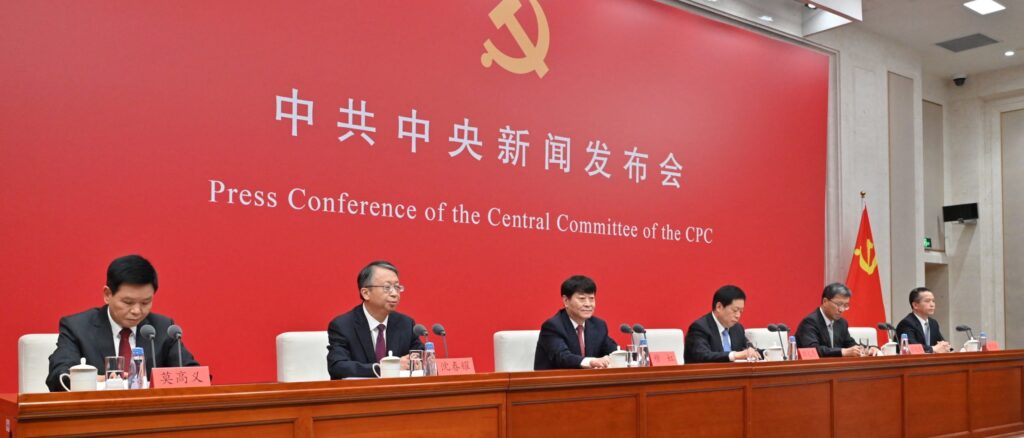Chinese officials called on a group of U.S. business executives to improve perceptions of China and warned that investment restrictions could hurt their business interests in the country during a recent trip to the country, according to The Associated Press.
Representatives of the U.S.-China Business Council (USCBC) — a private nonprofit composed of more than 270 U.S. companies with business operations in China — visited the Chinese mainland this week to meet with Chinese officials and discuss trade policy and other important topics related to the U.S.-China relationship, according to the AP. While on the trip, Chinese officials reportedly warned the American executives that tough U.S. trade policies targeting Chinese goods — some of which are motivated in part by national security concerns — could end up hurting their interests in China, and urged the visitors to leverage their connections at home to improve “understanding” of China in the U.S.
Chinese Foreign Minister Wang Yi told attendees that he hopes they will use their relationships at home to push for a “correct understanding” of China that is “accurate,” according to the AP. Meanwhile, Wang Wentao — the Chinese commerce minister — warned USCBC attendees that restrictions on investment in China would “seriously affect the investments and operations of American companies in China,” though specifics about what that impact would look like are sparse. (RELATED: China Is Rapidly Expanding Its Surveillance Capabilities In America’s Backyard, Report Finds)
Beijing Angry After US, NATO Members Issue Strongest Condemnation Of China Yethttps://t.co/utZEcL6RYg
— Daily Caller (@DailyCaller) July 12, 2024
Prominent executives in attendance for the trip to China include FedEx CEO Raj Subramaniam, Boeing Global President Brendan Nelson and Roberta Lipson, the CEO of a health care company called Chindex, according to the AP. Craig Allen, president of the USCBC, said his organization would like to build on past experience to “realize a more stable, fair and predictable business environment in China, address longstanding and new barriers to China’s market” while improving relations between Beijing and Washington.
The House Select Committee on the Chinese Communist Party had a different reaction to the AP story.
“Communist China poses the greatest national security threat of our lifetime. This is a brazen attempt by the CCP to weaponize the US business community against policy efforts aimed to strengthen our national security and economic prosperity,” the committee wrote in a post to its official profile on X, formerly known as Twitter. “Most American business leaders are patriots who won’t take the bait and become lobbyists for the CCP. For any others, we look forward to their filings under the Foreign Agents Registration Act.”
Both the Trump and Biden administrations have implemented tariffs targeting Chinese goods, with President Joe Biden most recently unveiling or enhancing a bevy of tariffs targeting Chinese goods in May. Those tariffs specifically targeted goods like Chinese electric vehicles (EVs), EV battery components, critical minerals, port cranes, solar cells, steel, aluminum, certain medical products and more; the White House stated that some of the tariffs were crafted with national security considerations in mind.
Chinese officials have voiced strong opposition to the tariffs and other efforts to limit China’s access to advanced technologies, according to the AP.
Notably, a recent report by the U.S.-China Economic and Security Review Commission (USCC) found that Chinese influence operations are becoming more sophisticated in the realms of business, academia and politics.
“In the economic sphere, Beijing attempts to align the commercial interests of other countries with its own strategic goals and to distort domestic policymaking. In countries with weak institutions, China often employs outright corruption, enriching ruling elites who advance its objectives,” the USCC wrote in its report. “In democracies, industry associations and business councils may serve as proxies for CCP interests. The CCP may also leverage business partnerships in strategic sectors to advocate for policies favorable to China.”
Additionally, business interest organizations have expressed concern about recent Chinese law enforcement raids of foreign business offices inside China, according to the AP. The Chinese economy has been wobbly in recent months, with recent growth numbers coming in below expectations while concern mounts about its debt-saddled local governments and real estate sector.
The Chinese government has undertaken an ambitious and multi-pronged stimulus plan to try to stabilize the country’s real estate market, though the strategy is far from guaranteed to work as an effective solution, according to CNN.
The U.S.-China Business Council did not respond immediately to a request for comment.
All content created by the Daily Caller News Foundation, an independent and nonpartisan newswire service, is available without charge to any legitimate news publisher that can provide a large audience. All republished articles must include our logo, our reporter’s byline and their DCNF affiliation. For any questions about our guidelines or partnering with us, please contact licensing@dailycallernewsfoundation.org.


